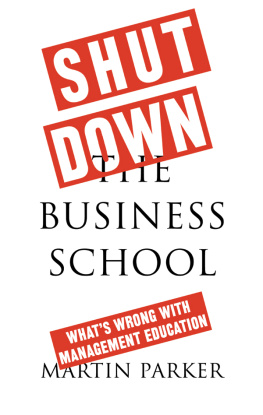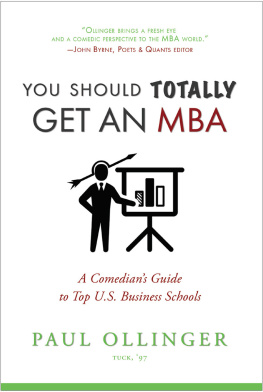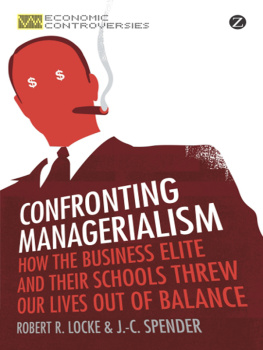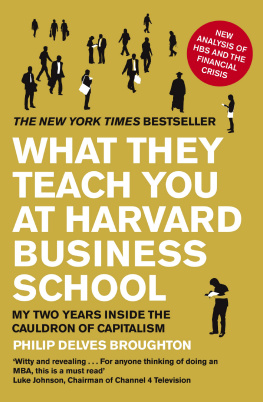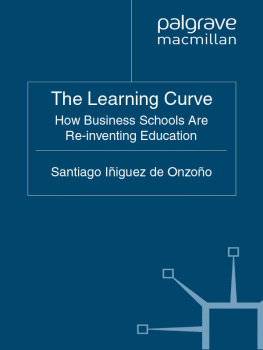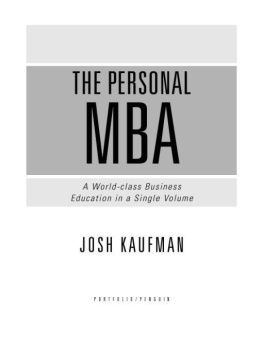Contents
Guide
Shut Down the Business School
Shut Down the Business School
Whats Wrong with Management Education
Martin Parker

First published 2018 by Pluto Press
345 Archway Road, London N6 5AA
www.plutobooks.com
Copyright Martin Parker 2018
The right of Martin Parker to be identified as the author of this work has been asserted by him in accordance with the Copyright, Designs and Patents Act 1988.
British Library Cataloguing in Publication Data
A catalogue record for this book is available from the British Library
ISBN 978 0 7453 9917 1 Hardback
ISBN 978 0 7453 9916 4 Paperback
ISBN 978 1 7868 0239 2 PDF eBook
ISBN 978 1 7868 0241 5 Kindle eBook
ISBN 978 1 7868 0240 8 EPUB eBook
This book is printed on paper suitable for recycling and made from fully managed and sustained forest sources. Logging, pulping and manufacturing processes are expected to conform to the environmental standards of the country of origin.
Typeset by Stanford DTP Services, Northampton, England
Simultaneously printed in the United Kingdom and United States of America
Contents
Acknowledgements
Thanks to all the audiences who have made generous comments on these ideas at various talks in various places over the past decade. Particular thanks to David Castle from Pluto for commissioning the book. Partly because of the long gestation of this work, as well as my laziness and lack of creativity, various chunks, fragments and flakes have been stolen from some earlier pieces. The main ones are: Managerialism and its discontents in S. Clegg and C. Cooper (eds) (2009) The Sage Handbook of Organizational Behaviour: Volume II. Macro Approaches, London: Sage, pp. 8598; The architect and the bee revisited: Managing, organizing and agency in A. Fuad-Luke, A.-L. Hirscher, C. Kuebel and K. Moebus (eds) (2015) Agents of Alternatives: Re-designing Our Realities. Berlin: Agents of Alternatives e.V., pp. 362371; This is water: Labours of division, institutions and history in C. Steyaert, T. Beyes and M. Parker (eds) (2016) The Companion to Reinventing Management Education, London: Routledge, pp. 497509; Organizing is politics made durable: Principles and alternatives (with G. Cheney, V. Fournier and C. Land) in A. Spicer and G. Baars (eds) (2017) The Corporation: A Critical Interdisciplinary Handbook. Cambridge: Cambridge University Press, pp. 538545, and Alternatives to management ideas in A. Sturdy, S. Heusinkveld, T. Reay and D. Strang, (eds) (2018) The Oxford Handbook of Management Ideas. Oxford: Oxford University Press. A very quick rehearsal of one of the ideas can be found as Schools for organizing in D. Barry and H. Hansen (eds) (2008) Handbook of New Approaches to Management and Organization London: Sage, pp. 213214, which was expanded into Towards an alternative business school: A school of my book Against Management (2002) Cambridge: Polity.
And this book is dedicated to my dad.
Preface
Business schools have huge influence across the Global North, yet they are also widely regarded to be intellectually fraudulent places, as well as being implicated in producing the culture of short-termism and greed which has led to innumerable business scandals. This short book proposes that they should be closed down, and replaced with a something that I will call the school for organizing. Most business schools exist as parts of universities, and universities are generally understood as institutions with responsibilities to the societies they serve. Why then do we assume that degrees in business should only teach one form of organization capitalism as if that were the only way in which human life could be arranged?
My proposal in this book requires substantial intervention in the governance of universities, and questions the increasingly common assumption that they are simply institutions which should respond to what students and employers want them to provide. I also assume that what gets taught and researched at universities matters, in the sense that it influences what students think, and hence shapes the horizon of the societies that we live in. If we want to be able to respond to the challenges that face human life on this planet, then we need to research and teach about as many different forms of organizing as we are able to collectively imagine. For us to assume that global capitalism can continue as it is, means a path to destruction. So if we are going to move away from business as usual, then we also need to radically re-imagine the business school as usual. And this means more than pious murmurings about corporate social responsibility, the crocodile shedding tears while its jaws tighten on your leg.
Saunter around the average university campus nowadays, and its likely that the newest and most ostentatious building will be occupied by the business school. Because thats the point. The business school has the best building because it makes the biggest profits (or, euphemistically, contribution or surplus) as you might expect, from a form of knowledge that teaches people how to make profits. Of course, there are plenty of critics of the business school conservative voices bemoaning the arriviste MBA, employers complaining that its graduates lack practical skills, Europeans moaning about Americanization, and radicals wailing about the concentration of power in the hands of the running dogs of capital. To add to the clamour, from 2008 onwards, there were plenty of commentators suggesting that business schools were complicit in producing the crash, teaching selfishness and the engineering of fiendishly complex financial instruments that no one really understood. There are a few people offering solutions to the problem of the b-school, but most shy away from radical restructuring, and instead tend to suggest a return to (supposedly) more traditional business practices, or a form of moral rearmament decorated with terms like responsibility, diversity and ethics. All of these suggestions leave the basic problem untouched, that the business school only teaches one form of organizing market managerialism.
Thats why I think that we should call the bulldozers in and demand an entirely new way of thinking about management, business and markets. If we want those in power to become more responsible, then we must stop teaching students that heroic transformational leaders are the answer to every problem, or that the purpose of learning about taxation laws is to evade taxation, or that environmental costs are external to supply chain logistics, or that creating new desires is the purpose of marketing, and so on. In every case, the business school acts as an apologist, selling ideology as if it were science as part of one of the longest public relations campaigns in history.
What might a different sort of research and teaching agenda look like? To put it rather bluntly, how can the discipline of management stop being mere advocacy and become a proper field of enquiry? My answer is to propose a school for organizing, as an academic discipline and political practice that is intended to discover a different world, not merely reproduce the one that we have. Organizing is all around us, and it is a topic of enquiry which clearly overlaps with other parts of the social sciences and humanities sociology, anthropology, politics, history and so on. The school for organizing wouldnt need its own shiny building to stress its distinctiveness, because it would have to work with teachers and researchers who could show us variety and strangeness, rather than endless recitations of the same. No form of organization would be off-limits, so we might imagine courses and research projects on the circus, families, queues, city-states, utopias, villages, sects, matriarchies, mobs, gangs, cities, clubs, segmentary lineage systems, pirates, the mafia, Occupy and the Apollo moon landings. Why would the study of literature not be relevant to the understanding of organization? What lack of imagination allows us to think that we can learn nothing from the initiation ceremonies of secret societies, the baking of cakes for a village fair, or the nine orders of angels in a celestial hierarchy?

